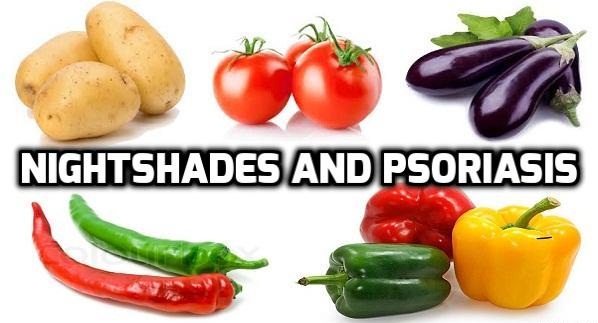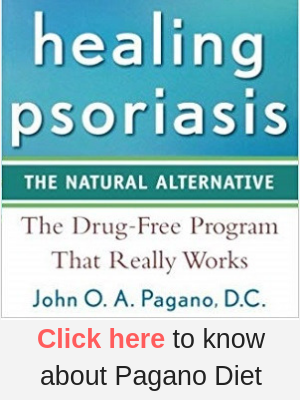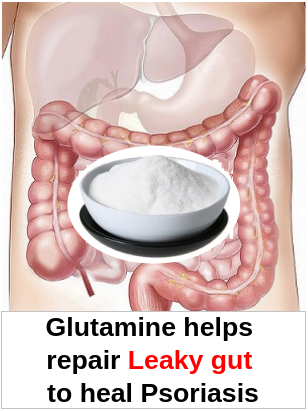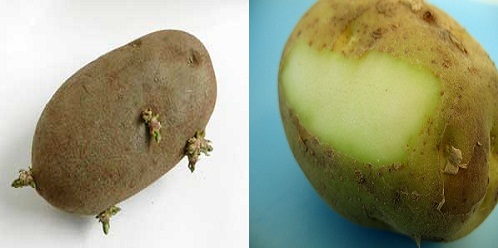When you experience an outbreak in psoriasis, you would feel just to do anything at all to keep the things under control. A lot of times, people would ask me about the relation between nightshades and psoriasis. They would wish to know if quitting or limiting the consumption of these frequently used foods can relieve psoriasis symptoms.
Various diet protocols (including Dr.Pagano’s and Paleo’s diet regimens) to heal psoriasis and other auto-immune diseases have advised not to eat nightshades vegetables and fruits, at least during the treatment.
Read more: Dr Pagano Diet for Psoriasis Healing
Let us try to understand what these nightshades exactly are and why they have been pictured so harmful.
What are nightshades
Nightshades is a general name given to a family of plants which are the members of the Solanaceae plant family. There are more than 2800 plants in this family. Most of them are non-edible due to their very toxicity. Taking advantage of their high toxicity, some drug formulations use them in extremely small quantities to combat bacterial and viral fever.
Only a handful of these nightshades are edible (listed below):
- Tomato
- White Potato (sweet potato is not a nightshade)
- Eggplant
- Peppers (chili pepper, cayenne pepper, paprika, capsicum)
- Tobacco (smoking)
It should be noted that sweet potato and black pepper are not nightshades.
The toxicity level in these edible nightshades is too less to be concerned about. There are no such documented harmful effects of these delicious foods- neither in animal studies nor humans. Hence, for the general public with healthy digestive systems, edible nightshades are pretty fine.
But, if you are dealing with an inflammatory health disorder related to a compromised gut and immune system, then you need to consider the ill effects associated with these foods before consuming them.
In earlier times, people in some parts of the world had completely boycotted the consumption of edible nightshades, fearing the high toxicity of non edible ones. However, edible nightshades are fine for daily consumption for majority of the people.
But, if you are dealing with any of the below listed disorders, then read this article before making a decision to eat these edible nightshades:
- Joint pain, muscle stiffness, arthritis, osteoarthritis
- Auto-immune disorders (psoriasis, psoriasis arthritis, rheumatoid arthritis, scleroderma)
- GERD, chronic acid reflux (heart burn)
- Sensitive gut, leaky gut and poor digestive system
Nightshades and Psoriasis
I am sure that you are alarmed enough after finding Psoriasis in the above disease list. Nightshades composition includes a few culprits that can anger your psoriasis. Let us know about them in detail:
- Alkaloids
These chemical compounds act as a natural defense for these plants against pests, molds and animals. To accomplish this job, alkaloids have a certain level of toxicity. In non edible nightshades, alkaloids are highly concentrated. But, in edible ones, their concentration is very less and that too mainly in the leaves and stems. The alkaloid content in actual eatable portion is very less and not of any major concern at all for the general public.
Out of all the 4 types of alkaloids, edible nightshades possess only one- steroid alkaloids. Hence, we would restrict our discussion to this particular alkaloid only. Examples of steroid alkaloids are solanine, nicotine and capsaicin.
These steroid alkaloids can irritate your gut by affecting the cell linings of the digestive tract to worsen leaky gut.
An animal (mice) study published in the journal- Inflammatory Bowel Diseases, Sept, 2002- observed that potato alkaloids can adversely affect the leaky gut syndrome to worsen inflammatory bowel diseases.
Solanine, an alkaloid (particularly found in potato and eggplants), hinders the breakdown of the primary neurotransmitter responsible for muscle contraction. It can result in muscle stiffness by increasing the muscle contraction time. Regular ingestion of solanine can cause muscle inflammation, stiffness and pain. The World Health Organization has set an upper limit of solanine in potatoes- 20 mg per grams. Potatoes, with alkaloid content above this limit can’t be sold in stores as they are potentially toxic as a human food. I really don’t know if the potatoes sold here in local vegetable markets adhere to this norm.
We all know that tobacco contains nicotine which is very addictive in nature. Nicotine hinders the healing process. To our surprise, all other edible nightshades (hope you remember that nicotine is a nightshade) also contain nicotine. That’s why some people find it so difficult to quit eating them during the treatment regimen. But, the nicotine concentration is too less to impose any of the nicotine borne health hazards.
It would take more than a few pounds of eggplants to match up with a piece of cigarette as far as nicotine content is concerned, forget the other nightshades.
Read more: Smoking is an obvious trigger for Psoriasis
- Calcitriol
Nightshades also contain calcitriol which is a hormone, probably the most powerful hormone in the human body. It is a highly potent form of Vitamin D3. Don’t confuse calcitriol with vitamin D3. Its overall functioning and metabolism is quite different. Calcitriol signals the body to absorb calcium from the food you eat. It helps in maintaining proper bone density in the body. But, if you intake too much calcitriol, then it would increase the level of calcium in your blood. The body would quickly respond to reduce the level of calcium in blood by depositing the excess calcium in soft tissues such as tendons, cartilage, skin and blood vessels. It is known as soft tissue calcification. Chronic calcification can trigger joint pain and inflammation. Osteoarthritis, in simple terms, is the deposition of calcium in soft tissues of joints.
Read more: Turmeric is a natural anti-inflammatory herb
- Lectins
Lectins are carbohydrates binding proteins, found in all foods. Not all lectins are bad. Lectins contained in foods like dairy, grains and nightshades are gut irritants.
These harmful lectins:
- can damage your intestinal walls to cause leaky gut.
- can stimulate your immune system to further enhance the growth rate of skin cells to trigger psoriasis.
- are hard to digest. Undigested food means increased level of toxins.
Due to their sticky nature, lectins bind with the intestine walls to cause small gaps between the cells of the small intestine. This gap would facilitate leakage of undigested food particles into your blood stream to increase the level of toxins. Increased toxins trigger an auto-immune disorder like psoriasis.
Read more: Why body detox is necessary for Psoriasis healing
To consume or not to consume
Ideally, you should eliminate nightshades completely from your diet. The alliance between nightshades and psoriasis doesn’t seem harmonious.
Dr Norman Childers, Ph.D., in his book “Arthritis- Childer’s Diet that Stops It” says that nightshades are one of the major causes for various arthritic problems, including osteoarthritis and rheumatoid arthritis. According to a report published by Dr Childers’s Arthritis Nightshades Research Foundation, a detailed survey of over 1400 arthritic patients during a 20-year period revealed that eliminating/ cutting down on nightshades can greatly reduce the pain and inflammation.
Dr Garett Smith, a licensed Naturopath advises complete avoidance of nightshades for at least 6 weeks to get visible results. To make it better, avoid nightshades for your complete treatment regimen which can last up to 2 to 3 months and in some cases, it can go up to 6 months or more also.
But, it is an easier said than done task.
Most of the nightshades are so frequent in our diet and sometimes, it is almost impossible to avoid them. For example, in India, the use of spices in curries is mandatory and no spice formulation is complete without chili pepper. But, still, we can definitely limit the consumption of nightshades to very minimal quantity for sure.
Avoiding eggplant is quite easy because there are so many recipes available without eggplants. Tomato is a little difficult but quite possible. As far as potato is concerned, not only it is a nightshades, it is a rich source of complex carbohydrates (starch) as well. Sensitive gut doesn’t like foods rich in starch and carbohydrate and it takes a lot of efforts to breakdown them in simpler molecules for digestion. Hence, avoiding potato can help reduce the congestion of your digestive system and
Except capsicum, other varieties of peppers are used in very small quantities, You can further reduce their quantities.
The way forward
Once you start your psoriasis diet protocol, completely avoid all the edible nightshades for 2-3 months till your symptoms improve. Then, gradually re-introduce one nightshade at a time, check for inflammation, muscle pain, stiffness and gut problems. If no such observation, then include one more nightshade and so on. Do remember that even if you improve your condition significantly, consuming nightshades in reduced quantities is always a good idea for long term relief and maintenance.
If you are dealing with psoriatic arthritis, then eliminating/ cutting down on nightshades become even more important.
Tips to consume nightshades in a smart way
We have discussed enough about the hazards of nightshades for people dealing with auto-immune disorders. Ideally, you should not eat these foods at least during your treatment regimen. But, for some people, complete avoidance of nightshades is just too much. Although, they can limit the consumption.
Below listed tips can help you reduce the intake of problematic chemicals contained in nightshades:
- Never use sprouted potatoes because they have a high content of solanine (alkaloids). Similarly, if the potato is green in color after peeling off the outer skin, it is an indication of high solanine content. Discard the whole potato or at least cut off the green colored portion.
- Boiling or frying reduces the alkaloid content of all nightshades by 40-50%. The chemicals just moves out from the food to oil or water. Hence, if you are going to eat nightshades anyways, at least don’t use eat them raw. Do note that microwave baking wouldn’t help here.
- Always peel off the outer skin of potatoes because alkaloid (solanine) concentration is high in the skin.
- Never use green tomatoes. Use full ripe tomatoes instead. They are low in alkaloids. Similarly, prefer red peppers over green peppers.
References
http://abouttesting.testcountry.com/2010/06/6-common-food-with-nicotine-content.html
http://www.ijdr.in/article.asp?issn=0970-9290;year=2008;volume=19;issue=2;spage=88;epage=91;aulast=Reddy
https://www.ncbi.nlm.nih.gov/pubmed/12479649
http://www.noarthritis.com/research.htm
http://www.tribuneindia.com/news/spectrum/fitness/dark-side-of-nightshades/33168.html
http://www.ncbi.nlm.nih.gov/mesh?term=Solanum
http://www.whfoods.com/genpage.php?tname=george&dbid=206






wonderful article. i have done a lot of research too, and hold to Dr. Pagano’s experiences and books. thank you Ashish